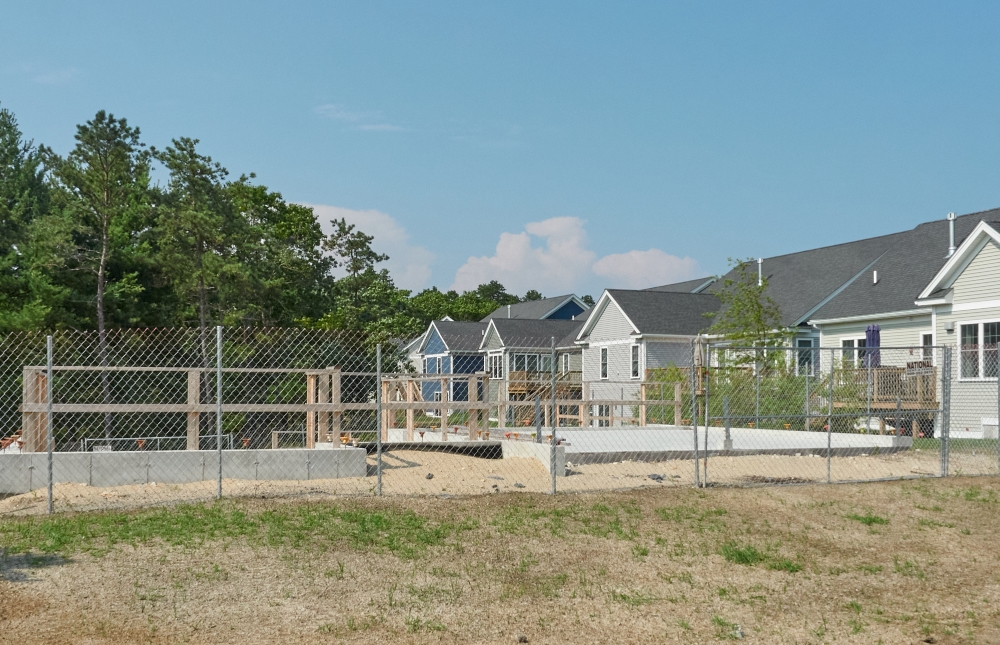Will Plymouth to finally say no to A.D. Makepeace Company? Makepeace cloaks itself in cranberries while most of its profits are from mining sand on its 12,000 acres of land. Makepeace claims this mining is cranberry farming. The sand is a globally rare commodity used for concrete, asphalt, and consumer products. Makepeace clear-cuts forests and after strip mining sometimes installs industrial solar and batteries. It is rapidly developing its 1,320 acres at Redbrook. The company promises one thing and does another, exploits regulatory loopholes, and exercises its political clout to secure taxpayer subsidies for its private profit-making ventures. This is nothing new.
The Plymouth Independent reports on Makepeace’s attempted bait and switch at Redbrook. In 2008, Makepeace proposed 1,075 homes at Redbrook, according to its Environmental Impact Report and the town granted permits for 1,175. Now Makepeace (and the town planner) argue that really meant 113 more – a total of 1,288 homes. In 2008, Makepeace also promised it would develop its 6,500-acre “Tihonet Mixed Use Development” (TMUD) as a “model of smart growth and open space”. Today the TMUD area in Plymouth, Carver, and Wareham is close to 1,000 acres of strip mines and industrial solar. The Plymouth Planning Board recently approved Makepeace’s plan for two miles of industrial solar and batteries in TMUD area, in the heart of the Pine Barrens ecosystem near the biodiversity hotspot known as the Frogfoot River. This is just to the north of about 250 acres of existing and proposed deforestation and strip mining for solar in Wareham.
In 2014, the Plymouth Zoning Board of Appeals gave Makepeace a sand mining permit worth about $70 million in today’s dollars. The permit required quarterly inspections and a donation of 300 acres of conservation land in exchange for the mining. In 2022, Community Land & Water Coalition exposed that the permit expired and the reports and 300 acres were missing. The building inspector, Mr. Mayo (who just resigned), told the board the inspection reports were “discretionary” in a public hearing. While Makepeace claims it “has recorded 1,516 acres” of conservation land, much was bought from Makepeace with taxpayer dollars by the state and other land was conserved as a requirement to get a permit to destroy forests for development.
Yet Makepeace manages to continue to benefit financially from taxpayer subsidies. In May 2024, Plymouth Town Meeting voted to “donate” $4 million to underwrite Makepeace’s development at Redbrook. In 2023, the Select Board waived the right of first refusal for the next phase of Redbrook expansion around Deer Pond – an arrangement that let Makepeace keep the land in Chapter 61 and pay almost no taxes, even though the land was to be developed under the 2008 Redbrook permit. In 2023, Plymouth handed Makepeace a contract to supply sand strip mined from Carver to “renourish” Plymouth Beach. While trucks operated by the current chair of the Carver Earth Removal Committee were delivering sand to the beach, it was blowing out to sea on windy days in March.
Now, Makepeace is asking the town for $1 million in taxpayer money to buy degraded, non-productive cranberry bogs on Rocky Pond Road/Black Cat Road. Makepeace played a role in strip mining the land around the bogs using the bogs as a pretense to obtain mining permits for “agriculture.”
According to the Sand Wars in Cranberry Country report, Makepeace is responsible for about 75 percent of the 2,600 acres of forests in Southeastern Massachusetts that have been strip mined since 1990.
Makepeace is a private corporation based in Wareham. Its motto is “Inspired by Nature.” It plans to create a “tiny forest,” a Miyawaki, at Redbrook. According to Makepeace’s project executive, Dan Gorczyca, the recreated faux forest shows a “sophisticated understanding of environmental issues and concern for the planet.” How about Makepeace just stops cutting down ancient, intact forests instead, stops polluting the air with sand from its open pit mines, and stops shipping hundreds of trucks daily loaded with sand strip mined from our aquifer? No matter how many fancy formulas are used, when land is strip mined, nothing will grow again in a human time frame, and it creates an open wound on our drinking water supply.
Will Plymouth just say no?
– Meg Sheehan
Meg Sheehan is a public interest environmental lawyer and Plymouth native. She is a co-founder of several grassroots campaigns, including the Community Land and Water Coalition.

